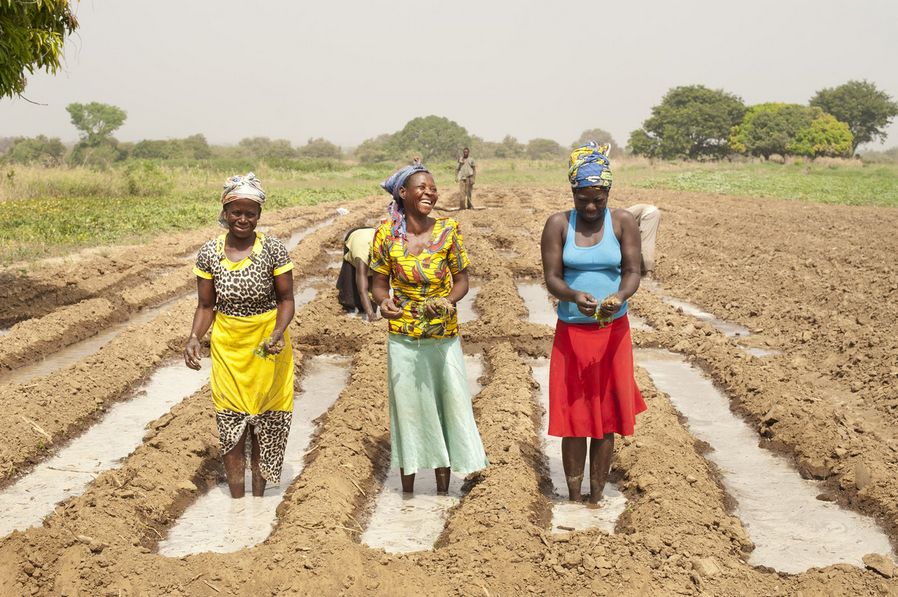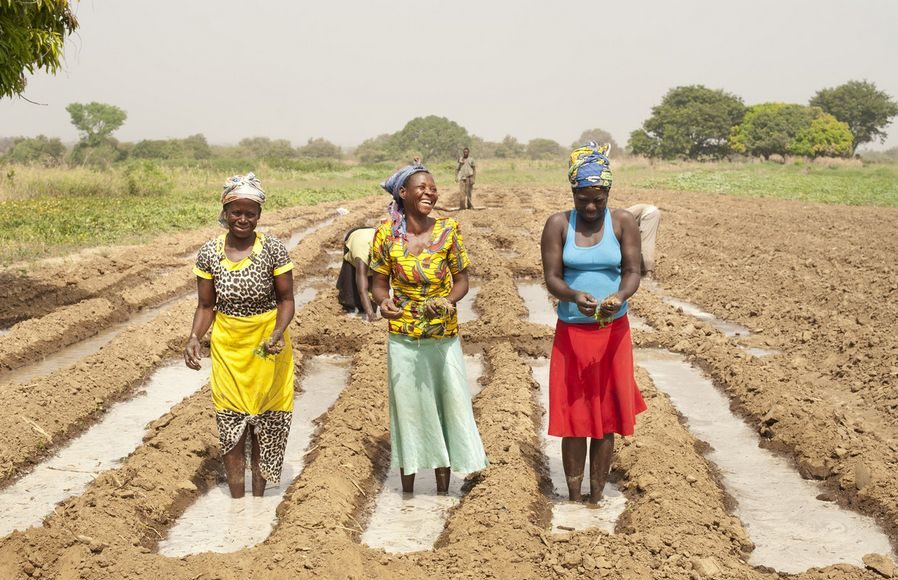Vulnerable communities are benefiting from improved climate resilience and reduced water-related risks, as a new series of IWMI Water Issue Briefs shows.
By Olufunke Cofie, Regional Representative – West Africa (IWMI)
In recent decades, water shortages in sub-Saharan Africa have become more intense and less predictable. Climate change is expected to aggravate the situation by affecting temperatures, rainfall patterns, and the frequency and intensity of storms.
According to the latest report published by the Intergovernmental Panel on Climate Change, West Africa could face particularly high water risk. Largely dependent on rain-fed agriculture and already vulnerable to floods and droughts, the region faces declining crop yields by as early as 2050 if the large-scale water cycle changes already observed get any worse.
Climate change adaptation and mitigation measures are, therefore, essential to ensure long-term food security and sustainable development. Water is at the heart of all these measures. Applying decades of experience in water management, the International Water Management Institute (IWMI) is working to improve climate resilience and reduce water-related risks for vulnerable communities across West Africa, as a new series of Water Issue Briefs shows.

Helping farmers get ahead of climate risks
To prepare for extreme weather events, IWMI and its partners have developed models to forecast and monitor droughts and floods on national and regional scales. As extreme weather events caused by climate change become more frequent, these models are helping to inform disaster management planning, alert farmers when flooding is likely, and enable insurance companies to verify claims for flood-related crop losses.
Mainstreaming good agricultural water management practices
Rising temperatures and changing weather patterns are also increasing the urgency to mainstream good agricultural water management (AWM) practices. Farmer-led irrigation, in which farmers drive investments in irrigation technologies, has emerged as a particularly promising AWM practice. It also has huge potential for expansion, as the case of the Upper East Region of Ghana shows.
IWMI’s emphasis on small-scale, farmer-led irrigation complements earlier trends in research and investments that prioritized public, communal irrigation schemes. At the small-scale level, IWMI’s research shows that when farmers take irrigation into their own hands, they are able to increase production, both by supplementing their rain-fed crops with irrigation water and by growing an additional harvest during the dry season. This can have immense benefits, including better nutrition and higher incomes.
Improved water access throughout the year could be particularly attractive to young farmers. In the Upper West Region of Ghana, where IWMI is investigating the link between climate change and migration, water stress due to unpredictable rainfall and poor management of water resources is among the factors causing young farmers to move to cities in search of new opportunities outside of agriculture.
IWMI and its partners have successfully initiated multi-stakeholder dialogues around these issues. Bringing together development planners and decision makers in the community – including farmers, local leaders, government officials, environmental agencies – we facilitate discussion on how various solutions, such as water storage and irrigation facilities, might affect the region.
The dialogues aim to encourage young farmers and migrants to share their experiences with policy makers, and together find contextually relevant ways to improve water governance and access. In turn, government officials are better able to support policies and interventions that promote food system resilience, and sustainable and inclusive rural economic growth.
Supporting post-Covid-19 recovery
More recently, the role of water in building resilience to systemic shocks, such as Covid-19, has made management of this valuable resource a renewed priority among policy makers and development planners. In particular, the role of water management in safeguarding sanitation, health, and food production has come into sharp focus.
IWMI is helping to inform national post-Covid-19 recovery plans by advising governments and environmental and health agencies. In Ghana, this took the form of a national policy dialogue to kickstart discussions on social transformation and inclusive development in a post-Covid-19 era. The dialogue focused on innovations and programs that will ensure sustainable growth and climate adaptation in the wake of the pandemic.
Water in a circular economy
In terms of sanitation and health, access to adequate amounts of clean water was a concern in West Africa even before the pandemic hit. This was due to population growth, urbanization, and changes in consumption. Building on decades of research in the sanitation value chain, IWMI has developed a range of approaches for safe waste management that aim to improve sanitation and enhance water, energy, and food security. These approaches include waste-based business models such as integrating aquaculture into wastewater treatment and converting fecal sludge into high-performance fertilizer. We are now investigating options to scale up these approaches in ways that minimize environmental pollution and support a circular economy.
IWMI’s work makes it clear that new strategies and solutions are needed for more productive and sustainable water use in the face of changing climatic and demographic conditions. By providing solid evidence to guide the removal of technical, economic, social, and institutional barriers to the expansion of sustainable water management, we are paving the way for sound policy making and investments that could benefit millions of people across West Africa.


